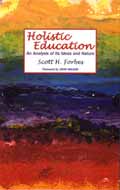|
Teacher Development Program
|
This
program is currently being developed in Portland, Oregon,
in coordination with the planning of our elementary school.
In the meantime, you may read An
Overview for Teachers, to learn more about the entire
field of Holistic Education.
|
Holistic Education: A Summary
Holistic
has a long and distinguished provenance. In the most widely
quoted history of Holistic Education1
its origins are traced back to Jean-Jacques Rousseau through
the great educators of the last two centuries. Many, however,
would trace its origins back to the first impetus in man to
develop into the finest and best version of a human being that
was considered possible.
At
the heart of Holistic Education is the goal of what has been
described as Ultimacy, i.e., the finest, greatest, most ultimately
developed person possible. For some cultural perspectives this
has been a religious objective (e.g., Salvation, Satori, Enlightenment,
etc.) while for other perspectives this has been a psychological
objective (e.g., Unus Mundus of Jung, Self-Actualization of
Maslow, the 'fully functioning human' of Rogers, etc.). In many
recent perspectives the religious and the psychological have
no clear separation with consciousness being the seat of both
religious realization and the psyche. Regardless of the particular
notion of Ultimacy, Holistic Education initiatives have held
that the objective of education is necessarily Ultimacy and
not preparation for earning a living or social enculturation
(even though these lesser concerns must be appropriately addressed).2
The
learning seen as necessary for Ultimacy is understood to be
different in nature to the learning involved in the simple acquisition
of knowledge (e.g., acquiring information about love is seen
as different from learning to love). As such, Holistic Education
has frequently emphasized the importance of different kinds
of knowledge, such as 'experiential' knowledge or 'competence.'
These different kinds of knowledge are usually seen as involving
more of the student than just their brain, and many Holistic
Educators from Rousseau onwards have promoted the importance
of educating the whole child (all parts), educating the child
as a whole (rather than as an assemblage of parts), and educating
the child within a whole (rather than thinking the child's education
can be understood in isolation from the child's context - family,
neighborhood, society, etc.).
The
'experiential' or 'competence' nature of the knowledge that
needs to be acquired necessitates different pedagogic processes
and different teacher/student relationships than are common
in mainstream education. While there have been substantial differences
through the history of Holistic Education in the details of
these, there is broad consensus. The pedagogic process is generally
meant to reveal (through the developing individual interests
and understandings of the child) the nature of each child, rather
than attempt to shape or mold the child. Consequently, it stands
in sharp contrast to the tabula rasa perspective of education.
The pedagogic relationship is generally seen as requiring authenticity,
empathy and the absence of role playing; engendering mutual
respect, understanding and affection. Consequently, Holistic
Education claims that coercion and fear destroy the relationship
required and are therefore anti-educational. This results in
different approaches to questions of authority, assessment,
curriculum, the nature of the pedagogic-space, teacher development,
and most other aspects of schooling.
While
many holistic education school founders will be mentioned such
as Montessori, Steiner, and Krishnamurti, it is Holistic Education
as a generic form of pedagogy which will be explored.
|
Program
Overview
Holistic
Education Summary
Action
Research
Courses
Offered
Support
Facilitator
Policy
and Credits
Overview
for Teachers
FAQs
about
Holistic Education
Articles
Teacher
Development Program
Holistic
Education Research
Contact
Us
The highest function
of education
is to bring about an integrated individual who is capable
of dealing with life
as a whole.
-J. Krishnamurti
Recommended
Book:

|